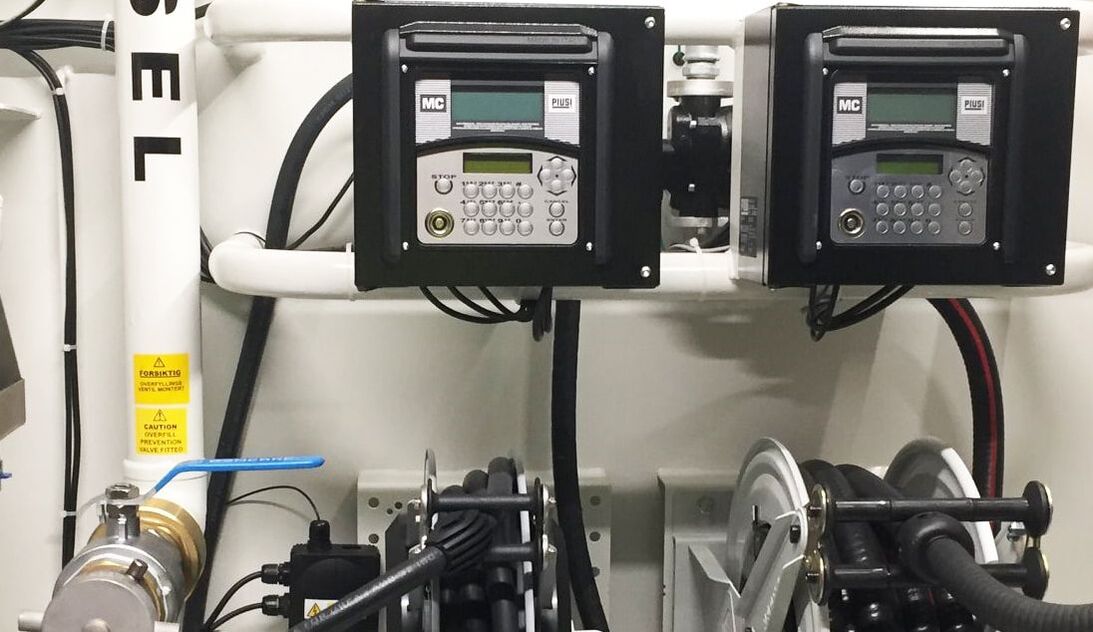Britain’s leading fuel tank manufacturer expands into USA with UL-Approved 250 Gallon Fuelcubes15/8/2023
Following years of consistent growth, Fuel Proof®, Britain’s leading fuel tank manufacturer, is now extending its presence into the USA with the first transatlantic shipments of its US-variant Fuelcube bunded steel diesel tanks. Specifically adapted for North America, the UL-Approved 250 Gallon Fuelcube is already making its way into Texas, Kansas and Florida for use in the agricultural and construction sectors – with more shipments on the way from Fuel Proof’s British factory to their new base in Kansas City, MO. Available with 12/24V and hand pump diesel dispensing kits, the Fuelcube tank is Fuel Proof’s most popular product – with hundreds in progress and out on delivery from their Lancashire manufacturing facility at any one time. The company’s signature fuel tanks are jointly constructed by a team of expert welders and three robot welding arms in order to handle consumer demand. Now adapted to the US market with full UL 142 Certification, the 250 Gallon Fuelcube combines the best of British engineering and manufacturing standards into a 110% bunded fuel storage and delivery system which is compact, stackable, easy to move and easy to use. But first and foremost, the all-steel Fuelcube is designed to be secure. “In every sector, from agriculture to aviation, fuel security is our customers’ top priority,” says Andrew Hargreaves, Fuel Proof MD. “Flow rates and compliance with regulations are crucial to any organisation running fuelling operations on-site, but above all else people need a guarantee that their fuel is safe. Safe from any would-be thieves trying to access the fuel tank, and safe from any legal and environmental issues if that tank sustains any damage during its everyday service. Combine that need for security with total ease-of-use, for as many end-users as there are industry sectors, and the answer is the Fuelcube system. It’s been a constant bestseller across the UK and Europe for many years, and now I’m proud to say that Fuel Proof, and the Fuelcube, are coming to America.” Reflecting its 23-year path to success in the UK and overseas, the company now has its sights set firmly on the United States’ vast agricultural sector. With over two million farms in operation across the USA, American agriculture represents an immense opportunity for any manufacturer willing to put customer, and quality, first. “Certainly, we’re up against plenty of competition in terms of supplying fuel storage solutions to the US. But when it really comes down to product quality and manufacturing expertise, the Fuelcube has a distinct advantage. Our competitors focus on output quantity, while we’ve always kept our eye firmly on product quality.” It’s this focus on quality which is behind Fuel Proof’s ongoing success and expansion, since it was first formed in 2000 in Settle, North Yorkshire – growing from a fuel tank hire company servicing customers in the North West of England, into a global exporter of industry-leading fuel tanks and aviation refuelling systems. The company’s 25,000 sq. ft. assembly and warehouse facility in Heysham, England is currently undergoing major expansion work, with not one but two construction sites now set to massively expand the manufacturer’s fabrication, shot-blasting and polyurethane paint-coating capabilities. But the company isn’t only expanding production space to increase output on its existing products.
“We’re entering into an exciting new phase for Fuel Proof, with solar power now playing a major role. While our 250-gallon Fuelcubes are heading out to the United States, we’ve also further developed our European Fuelcubes to incorporate a new solar charging system, powering the tank’s 12/24V fuel dispensing pump via a built-in battery, for self-powered fuel dispensing that truly is foolproof. Added to our new Solar Fuelcubes, further solar storage products are now through the design phase and entering into production. Going forward, Fuel Proof is expanding beyond just fuel storage, into energy storage more broadly – and not only in the UK and Europe, but with our sights set on the USA and around the globe.” To find out more about the full Fuel Proof range, or to enquire about a specific storage product, please contact (816) 921 7441 or [email protected] in the USA, or alternatively contact +44 (0)1524 850 685 or [email protected] in the UK and overseas. Fuel Proof has had a phenomenal 2022, and it's all thanks to you – our customers, distributors, partners and subscribers. From all of us here at Fuel Proof, allow us to say a massive thank you for your business this year – and wishing you a Merry Christmas and a very Happy 2023! Christmas opening hoursPlease note that we close for Christmas on Friday 23rd December, 2022.
We are open again from Tuesday 3rd January, 2023. If in the meantime you would like to enquire about our fuel tanks or fuel storage products, please click here to leave us your message, and we will respond as soon as we can once we return. So until 2023, we wish you a very Merry Christmas, and a fantastic New Year! Last month we invited the fifty-strong Vale O’ Lune Young Farmers' Club on a guided tour of the Fuel Proof design and manufacturing facility, demonstrating the full range of production processes involved in turning sheet steel and laser-cut components into our market-leading fuel tanks and bowsers. Welcoming the happy crowd of Young Farmers on site one warm September evening, we began the factory tour with a live demonstration of our incredible Cyber-Weld robotic welding arms, used by our manufacturing department on a daily basis to automate certain stages in our Fuelcube fuel tank production. As Fuel Proof MD Andrew Hargreaves explained to our young visitors, with so much demand for our bestselling stackable fuel tanks, we simply wouldn’t keep up with our customers’ bulk orders without the use of this advanced welding automation tech. Our factory’s robot welding arms operate alongside our most experienced welders, bringing the best of both worlds to our fuel tank production process. Once our Cyber-Weld robots have handled the more basic and time-consuming welds along our tanks’ main joins, our expert human team then take over to bring each tank to completion – and run through a series of checks to guarantee exceptional quality and compliance on every Fuelcube tank we sign off. Next up on their tour, the Young Farmers were shown through our facility’s vast main factory floor. It’s here that our CNC plate roller, floor-mounted rails and multiple overhead cranes which make up our automated boom welding system enable our army of welders to turn flat sheet steel into 110% bunded, best-in-class fuel storage equipment for our thousands of customers, both nationally and across the globe. The Young Farmers’ tour continued into our adjoining Fabrication and pipe bending workshop, showing our visitors the two giant Bystronic press brakes and laser cutting hardware which produce our fuel tanks’ precision parts, fittings and fuel lines – all of which are designed in-house for optimal performance, and for industry-specific fuel storage compliance. Next up, Andrew showed the tour party through our industry-leading shot blast and paint facility, where our fabricated bare steel tanks are given their precision key surfaces, and each prepared for a super-tough two-pack polyurethane paint coating, carried out in our two specially designed spray booth ovens. Taking our crowd of visitors outdoors, on past our extensive storage yard and the coated fuel tanks awaiting their final fittings, the tour culminated in our warehouse and dedicated Assembly area for a Q&A session between Andrew and the Young Farmers, who were keen to know more about the business and its operations as a whole. With the site tour drawing to a close, our local Young Farmers concluded their visit with some very important takeaways. For the Club’s older members, whose thoughts were leaning toward running their own successful businesses: a far broader understanding of what it takes to succeed as a large-scale, industry-leading company in today’s British manufacturing sector. As for the Club’s younger members, they took away something even more valuable… the much-coveted Fuel Proof gift bag and cap! 👍
Our thanks to all members and organisers of the Vale O’ Lune Young Farmers – it was our absolute pleasure to have you on-site, and wishing you all the very best for the future, from all of us at Fuel Proof! Win this Fuel Proof® Fuelcube bunded diesel tank worth £3,000 – with all proceeds going to help fund our charity partner Bay Search and Rescue, and their lifesaving work across our local Morecambe Bay in the UK.
Tickets are just £5 each from Raffall.com, with the winner announced as soon as we reach 700 tickets sold! Winner please be aware that you'll need to arrange your own collection of this Fuelcube from Bay Search and Rescue in Flookburgh, Grange-over-Sands – but a pristine £3,000 bunded diesel tank for a £5 ticket is a total steal! :) Simply click this link or the picture below to enter our online raffle at Raffall.com – and good luck! From 1 April 2022, changes to UK law mean that many people and businesses who use red diesel (AKA rebated fuel; gas oil; tractor diesel) will need to switch to more costly white diesel, which carries the full Fuel Duty rate. Most UK vehicles and machinery will no longer be able to use rebated red diesel, especially in the commercial sector. From 1 April it becomes illegal to put red diesel into any tank, vehicle or machine not covered by the new rules. The switch to white diesel will increase fuel costs by about 47p per litre for many businesses and organisations across the country. This new ruling could have wide-reaching effects, as businesses pass increased fuel costs on to consumers. What’s changing?From the 1st April the use and storage of red diesel in vehicles, machinery and fuel tanks will be further restricted to operations such as farming and forestry, in line with new rules set out by the UK government. Briefly, red diesel will still be legal for use in agriculture, fish farming, forestry and horticulture; non-commercial heating and power generation; rail transport, marine transport, boating and sailing; circuses and other travelling fairs; and sports clubs including golf courses. For a more detailed list, please see below. From the 1st April, many businesses across the UK – ranging from construction and plant hire to recycling operations – will have a legal duty to switch to the use of white diesel immediately, or could face heavy fines. Red diesel itself isn’t being scrapped or price-hiked. It will just be legally prohibited for use by most of those businesses which used it previously, especially in the commercial sector. Why is this happening?This change to the red diesel rules is part of the Government’s 2050 net-zero decarbonisation plan. It’s aimed to encourage the wider use of white diesel and greener fuels by the commercial sector, especially in mining, quarrying, construction, plant, logistics, leisure and highway maintenance. Who can still use red diesel and other rebated fuel?The UK government has set out the following on the use of red diesel and rebated biofuels, restricting entitlement “to the following qualifying purposes”: • “For vehicles and machinery used in agriculture, horticulture, fish farming and forestry. This includes allowing vehicles used for agriculture to be used for cutting verges and hedges, snow clearance and gritting roads • To propel passenger, freight or maintenance vehicles designed to run on rail tracks • For heating and electricity generation in non-commercial premises – this includes the heating of homes and buildings such as places of worship, hospitals and town halls; off-grid power generation; and non-propulsion uses on permanently-moored houseboats • For maintaining community amateur sports clubs as well as golf courses (including activities such as ground maintenance, and the heating and lighting of clubhouses, changing rooms etc.) • As fuel for all marine craft refuelling and operating in the UK (including fishing and water freight industries), except for propelling private pleasure craft in Northern Ireland • For powering the machinery (including caravans) of travelling fairs and circuses”. Even then, there are particular rules on how red diesel can be used in these approved areas. For more info please refer to Government guidance via the link below. These rules will also extend fuel duty to “biodiesel, bioblends and fuel substitutes used in heating, applying the rebated duty rate to non-commercial heating and the full rate of duty to commercial heating.” (Source: gov.uk) How does the law change?Until now, the law regarding red diesel usage set out in the Hydrocarbon Oil Duties Act 1979 (HODA) has included references to ‘road vehicles’. But from 1st April 2022, references to ‘road vehicles’ in this legislation will change to the term ‘excepted machines’. These ‘exceptions’ to the new red diesel rules, and the purposes that red diesel is used for, have been strictly redefined in law. Currently around 15% of all diesel used in the UK is rebated red diesel. After the 1st April this percentage will drop significantly, and anyone caught using red diesel without entitlement could face significant fines, vehicle seizure, or even unlimited fines and imprisonment – since the unentitled use of rebated red diesel is technically considered tax evasion. Are other fuels affected?Yes. These changes affect the use of rebated red diesel, HVO (Hydrotreated Vegetable Oil), bioblend, biodiesel and fuel substitutes. Compliance: What you need to doIf your operation doesn’t fall into one of the excepted categories detailed above, then you have a legal responsibility to make the switch to white diesel from 1st April 2022. To be compliant with these changes you will need to:
“Contamination” in this respect refers to any presence of red diesel marker dye. The authorities test for this distinctive red dye to catch out anyone using tax-rebated red diesel illegally, and could well inflict heavy fines to enforce the new diesel rules. Important considerations when switching to white diesel fuel
How can you reduce higher costs associated with white diesel fuel?
Less fuel use, or longer fuel storage times, could also affect how much white diesel you have hanging around when it comes time to swap your summer and winter grades. So it’s well worth reassessing just how quickly you’ll be burning through your costlier store of white diesel fuel over the coming months, and when this summer-grade supply will need to be swapped out for the winter.
Add an advanced fuel management system on top of that, and suddenly you’ve limited the basic dispensing of your fuel to only those people who own an assigned app licence, or a key fob, able to activate your fuel tank and make it operate. Without a key fob or Bluetooth app licence assigned to them, someone attempting to use your fuel tank can’t take a single drop.
While you may not be able to combat the new higher cost of your white diesel supply versus that old red diesel, there are certainly ways to tighten up on its use and security while it’s stored on your worksites and premises. Instead look to prevent theft, preserve your supply over the seasons, care for your fuel stock with regular tank testing and cleaning, and measure your fuel’s dispensing to the last drop with a remote fuel management system. Preventing any of that costly white diesel going astray is as good as receiving money back on your fuel supply. And ultimately, that can only come down to investing in the right fuel tank for your business. And we can certainly help you there. More infoClick the link below to learn more about the red diesel restrictions from 1st April 2022, as detailed in the Government’s Reform of Red Diesel policy.
|
Fuel ProofHere's the latest fuel storage news, articles and info. Categories
All
Archives
August 2023
|
|
Fuel Proof Ltd
Middleton Business Park, Middleton Road, Morecambe Lancashire, LA3 3FH Tel: 01524 850685
Email: [email protected] |












 RSS Feed
RSS Feed